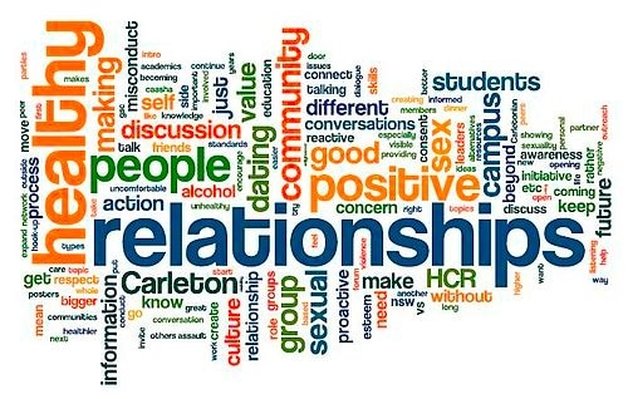|
“It is not easy to find happiness in ourselves, and it is not possible to find it elsewhere.”
 Relationships are everywhere. We cannot escape them. Some are easy to maintain while others, not so much. We have relationships with ourselves, family members, friends and those we work with. Not all relationships are the same. Each one has specific needs, expectations, demands, challenges and benefits. We depend upon our thoughts, beliefs, values, emotions and memories of our past experiences in order to participate and maintain the relationships in our lives. For some, we developed healthy relationship skills growing up and as adults are currently reaping the rewards. For others, who were not so lucky to have healthy relationship role models growing up, painful experiences, such as hardships and trauma, during the early years in life has led to relationship challenges in adulthood. There is no doubt in my mind, the trauma I experienced in childhood led to the relationship difficulties I experienced in my early adulthood. With low self-esteem, no confidence and the inability to identify my needs and express myself, I felt stuck and frustrated in most of my relationships. There were lots of conflicts and painful relationship breakups. At one point, I decided that I wanted to learn how to have and experience healthy, unconditionally loving relationships. Not knowing where to start, I bought lots of books, participated in self-improvement seminars and even sought out a therapist. After spending time getting to know myself, I discovered something pretty powerful. I discovered that in order to have healthy loving relations with others, I had to learn to love myself first. That said, the most important relationship in my life is the one I have with myself. Without further ado, below is a list of suggestions that I gained on my own personal journey as well as from working in jobs empowering others for over thirty-four years: 1. Get to Know You: Know yourself well. Discover the things that are important to you, such as your values, beliefs, likes, dislikes, and what makes you happy. Once you discover these things about yourself, surround yourself with like-minded people where you can support each other. There are countless resources, such as books, personal growth seminars, and life coaches, like myself, readily available to you when you are ready to say yes to getting to know the real you.I have listed at the bottom of this post some books I have found quite helpful in developing healthy relationship skills. When you stop living other people’s lives and start living yours, you are giving each other the chance to flourish into an amazing person. Getting to know yourself is a journey and takes time to materialize. It is a lifelong commitment in getting to know yourself.In knowing and understanding yourself well, you will make better choices, set and reach realistic goals, and ultimately live a fulfilling, productive, and happy life. There are all kinds of personality tests you can chose from to help you get to know yourself well. The one personality test I suggest to others is the one found at this link. When you have about 12 to 15 minutes, check out the link and take the test. Also, you will find a list of books in this post that will certainly help you get to know yourself well. 2. Create & Maintain Boundaries: Personal boundaries establish who you are to other people. These boundaries help others to know who you are and who you are not.If we are to grow and live as healthy, loving individuals, we need to take full ownership of our boundaries. When you own and respect your boundaries other people will not be confused and will most likely respect who you are as a person. Boundaries are vital to the success of healthy relationships. There are all kinds of boundaries: personal, emotional, verbal, physical, sexual, spiritual and much more. Having boundaries lets others know what are the acceptable behaviors in the relationship. When you state your boundaries, it shows the love and respect you have for yourself and for the relationship as a whole. Here are some tips on creating and maintaining healthy boundaries:
As you can see, setting and maintaining boundaries is vital to your survival. It sends a message to the world that you love and respect yourself and will take actions to take good care of yourself. If you would like to learn to how to create and maintain personal boundaries, feel free to reach out to me for free consult in how coaching can help you meet your goals.You can reach me via my website as shown in this document or can call me directly on my cell phone at (978)372-2284. Or contact me via this website. 3. Have Ground Rules: One of the biggest reasons for failed relationships, whether romantic or social, is the lack of an agreement in how to behave respectfully with each other. If you feel your relationships lack rules, sit down with the other person and agree to brainstorm on a list. Remember, it’s important to create a draft and work on perfecting it over time. These types of projects take time to create.Examples of rules might look like the following list:
4. Do not tolerate abuse of any kind: There are so many definition of abuse. Examples of types of abuse are verbal, emotional, sexual, physical, and spiritual. The definition of abuse I often use is “when someone maliciously mistreats another person”. Any form of abuse prevents relationships from being healthy. If you feel you are in a relationship where there is abuse, it is important to recognize this and seek out professional help. Abuse in relationships is common and often referred to as Domestic Abuse.If you suspect that you are in an abusive relationship and need to talk to someone confidentially, you can call the National Domestic Abuse Hotline at 1−800−799−7233. The calls are private and they will always ask you if it is safe to talk.Make sure you call when it is safe to call this hotline. 5. How to approach Introverts and Extrovert: Being an extrovert, I consider myself an outgoing, outspoken, and gregarious person. I happen to be in a relationship with a partner who is an introvert, which is normally a person who is relatively private or shy in nature. In the past 17 years of living with an introvert, I have learned some valuable lessons I would like to share. First, it is important to determine who is the introvert and who is the extrovert. Secondly, ask your partner what it is like being an introvert/extrovert. While asking questions, ask what makes your partner uncomfortable and comfortable when interacting with people. Lastly, avoid behaviors that are dismissive in nature.For example, avoid saying the following remarks to an introvert “I wish you were more outgoing” or “How come you are not a people person?”. These types of comments imply that there is something wrong with being an introvert. There are comments to avoid when in relations with an extrovert. For example, avoid making comments such as “I wish you would stop socializing so much” or even “Why do you always have to talk when we go out to social events?” Comments like these can make someone who is either an introvert or extrovert feel like there is something wrong with them. Take the time to learn about each other and understand the characteristics of introverts and extroverts. Your relationships, like mine will be very receptive to each other’s needs and the rewards are amazing. 6. Find and read useful books on relationships: There are so many books on learning to love yourself and having healthy relationships with others. Below is only a small sample of the many out there:
If there is a book you would like to suggest, please reply to this post with your suggestions so myself and other readers will benefit. Thank you. 7. Own your stuff: You are 100% responsible for your well-being. No one is responsible for making you happy. Happiness starts with you. Having others in our lives may bring happiness but true happiness starts deep within you.Like many, I have gone into relationships hoping I would find happiness or that the other person knows what I want and need.I was often disappointed and let myself down. In each relationship, both sides come with a great deal of life experiences. Those experiences shape how we each see ourselves and the relationships we are in. Our experiences can either help us or hurt us. This is why I feel it is important for you to know and apply the tips in this post to your relationships. Having had many painful relationship experiences, my goal is to empower you with knowledge and to seek out only those relationships that serve you. Since I have been on the path to self-awareness I have gained happiness, a sense of liberation, and a strong sense of fulfillment. The first three words in the book “The Road Less Traveled” by Scott Peck plainly states “Life is difficult”. I was troubled for many years after I read those words. I knew what he meant but deep down inside, I wish he said something like “Life is difficult but it doesn’t have to be”. That is my motto in life now. If you are in a relationship where you feel there are issues and you are unclear or feeling stuck on what to do, contact me for a free, private coaching session.In that session, I can show you how coaching can help you get both clear and unstuck so you can take the steps to experience healthy loving relationships. May you take the steps to make sure your relationships serve your well being.
3 Comments
Kathy Torimoto
4/1/2017 07:21:30 am
Another great book on relationships is The Five Love Languages. This helps to identify different styles and what that looks like. Excellent blog article!!
Reply
Cheryll Capodilupo
4/1/2017 11:00:53 pm
Great blog.
Reply
Leave a Reply. |
Tom Ellis, CPC
Tom is a Path Finder who is solution & action focused as well as a Life Purpose Specialist. Artist & Gentleman Farmer.
|


 RSS Feed
RSS Feed